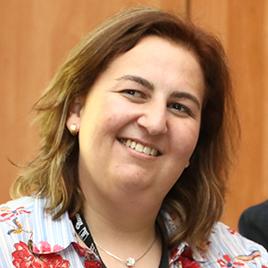Degree in Nutrition Sciences
More Information
- Language: This degree is available both 100% in english and 100% in portuguese (minimum class size requirements apply)
- 1st Cycle | 4 years | Daytime classes, with 240 ECTS
- Entry exams:
Biology and Geology (02)
- Application score:
High School average grade 60%
National exam Grade 40%
Program Description
Nutritionists are professionals equipped and qualified to explore, understand, and assess the impact of food on human development, health, and quality of life. They are responsible for nutritional status assessments, both at an individual/clinical level, and at a community level. Nutritionists establish food plans and enhance new product formulations, taking into account the promotion of well-being, prevention of chronic disease, and disease therapy/symptomology management.
Professionals may practice in hospitals/clinical settings, and health centers, but also at a community level in schools, city halls, catering establishments or sports facilities, as well as in companies, the food industry, or in scientific research centers. Nutritionists can also create their own positions by developing consultancy activities or establishing their own clinical practice.
Nutritionists can perform various activities:
- Work at a community level explaining the principles of nutrition and food and how to put them into practice
- Work at an individual level, with a multidisciplinary team, in formulating nutrition support prescriptions
- Assess nutritional risk, nutritional status and determine nutritional needs/requirements throughout the life cycle, in health and sickness
- Define food plans according to multiple criteria
- Advise on food production and distribution chains
- Promote health through nutritional counseling to groups of individuals, clarifying the relationship between food choices and health (or lack of it).
- Intervene, from childhood to old age, while being aware of the specific needs of each age group
- Conduct reference research in Nutrition Sciences
The Nutrition Sciences Degree lasts 4 years (240 credits - ECTS) and leads to entering professional life or to a relevant master’s (master’s courses at the ESB vary between three and four semesters).
What are the typical roles of a nutritionist?
ESB graduates in Nutrition Sciences are prepared to work in multiple areas of interest, namely:
- Evaluating the nutritional status and implementing nutritional therapy appropriate to different pathological situations in various health facilities (hospitals/clinical settings)
- Planning, implementing, managing, and evaluating community intervention programs in the area of food/nutrition in homes, local institutions, day-care centers, kindergartens, and schools
- Planning, implementing, and managing diets for athletes and sport practitioners
- Planning, implementing, and managing diets and menus for mass catering
- Quality, microbiological, nutritional, and sensory control of food products
- Designing strategies and implementing methodologies to improve traditional products, while considering the safety and health of the population
- Development of new functional products, encompassing production, nutrition and health
- Education and training
- Research, innovation and development
How is the ESB degree characterized?
These are some of the main aspects of the degree in Nutrition Sciences at the ESB:
- Active learning
- Learning process centered on extensive practice and hands-on methodology
- Specialized know-how in crucial nutrition interface domains (public health, food safety and processing, microbiology, clinical studies, etc.)
- Close access to research pipelines
- Integrated curricular internship (in Portugal or abroad)
- Access to a master’s (Bologna second cycle)
The market is looking for and rewarding individuals who have mastered multiple transversal skills (soft skills) enhancing versatility and enabling them to carry out a variety of projects. The ESB degree aims to maximize students’ preparation in:
- Interpersonal communication
- Teamwork
- Critical reasoning
- Professional ethics
- Time management
- Self confidence
- Leadership
- Creativity
- Volunteering
More Information
- Language: This degree is available both 100% in english and 100% in portuguese (minimum class size requirements apply)
- 1st Cycle | 4 years | Daytime classes, with 240 ECTS
- Entry exams:
Biology and Geology (02)
- Application score:
High School average grade 60%
National exam Grade 40%
Contacts
More Information
- Language: This degree is available both 100% in english and 100% in portuguese (minimum class size requirements apply)
- 1st Cycle | 4 years | Daytime classes, with 240 ECTS
- Entry exams:
Biology and Geology (02)
- Application score:
High School average grade 60%
National exam Grade 40%





